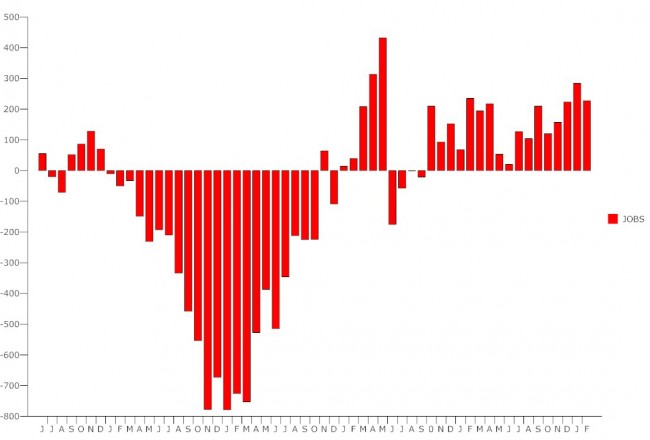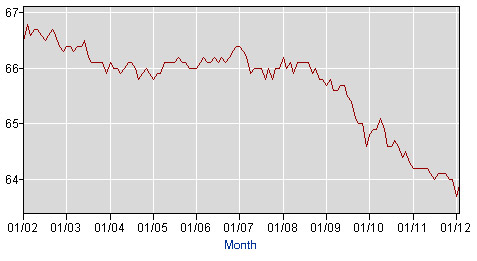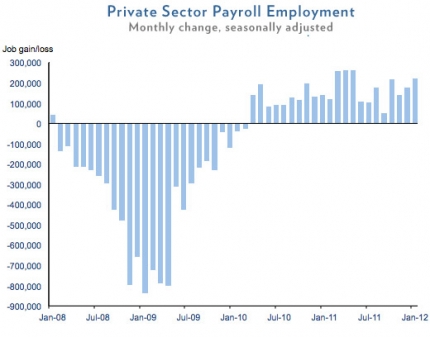
Last Updated: 9:44 a.m.
The U.S. economy is maintaining its job-creation momentum, adding 223,000 jobs in January, and revising upward previous job-creation figures for December and January by 61,000 jobs. Over the past three months, the economy added 730,000 jobs. The unemployment rate remained at percent for the second straight month, though the rate is the lowest since January 2009, when Barack Obama took office.
Politically, the numbers are a boon to Obama, who will be arguing that his economic policies are working. The numbers weaken the central plank of Mitt Romney’s campaign–that the nation needs a CEO who can improve its job prospects.
But with eight months until Election Day, plenty can change, and may already be changing: Friday morning brought worrisome data from China, the world’s second-largest economy, with factory output and economic growth slowing. Because of its huge market and trading imprint, the Chinese economy now has the power to do to the world economy what the U.S. economy once could in the past–send it into recession. Europe’s fiscal crisis hasn’t been resolved. It’s merely on pause. And oil prices (trading at $107 a barrel Friday) could rise dramatically if the standoff with Iran over its nuclear program explodes into military action.
On the other hand, the consumer confidence index, released Thursday, rose to a four-year high, while household wealth and wages continue to improve. The Friday jobs report shows average wages going up from $23.28 an hour to $23.31 an hour, a 0.1 percent gain. Obama’s success in convincing Congress to extend benefits for the long-term uninsured, coupled with the extension of the payroll tax cut for another year (employees will pay half their normal 6 percent Social Security tax) removes what would have been a drag on the economy, absent that agreement. In sum, the management of the domestic economy itself keeps yielding steady gains. Only factors outside of America’s control–the Chinese economy, Europe’s euro crisis, Iran’s nuclear ambitions–could reverse the gains at this point, if current trends continue.


The White House was quick to jump on the jobs report as “further evidence that the economy is continuing to heal from the worst economic downturn since the Great Depression.”
Some highlights by the numbers: Professional and business services added 82,000 jobs in February, with half the increase in temp jobs. Health care and social assistance employment rose by 61,000, for a total of 360,000 new jobs in health care over the past 12 months. Leisure and hospitality (i.e. tourism) added 44,000, jobs, with nearly all new jobs in food services and bars. Manufacturing added 31,000 jobs, led by gains in durable goods and fabricated metals. Mining added 7,000 jobs and construction, after two months of gains, was flat. Government employment was essentially unchanged in January and February, following an average monthly job loss of 22,000 in 2011 in that sector.
A few caveats: as the Wall Street Journal reports this morning, the positive jobs numbers may be inflated because seasonal adjustments artificially add jobs that may not actually be there. Looking at January, for example, when the Labor Department announced 243,000 new jobs, real-time income-tax-withholding data for the month showed 181,000 actual new jobs.
The White House was itself cautious about the new numbers: “The monthly employment and unemployment numbers can be volatile,” Alan Krueger, who heads the president’s Council of Economic Adviser, wrote, “and employment estimates can be subject to substantial revision. Therefore, as the Administration always stresses, it is important not to read too much into any one monthly report; nevertheless, the trend in job market indicators over recent months is an encouraging sign.






























Angela Smith via Facebook says
Of COURSE Gov. Scott will take the credit; he’ll be LYING, but he’ll do it anyway.
palmcoaster says
http://finance.yahoo.com/news/us-trade-deficit-hits-52-133525474.html
Our jobs creation will improve when we will resolve the above by taxing imports or demand that “they” buy from us the same amount of dollars, even if in other goods, that we buy from them (China, India,Japan, Korea etc). Brazil did it with mainly with China and others and that is why they are flourishing now.
Also if the administration will stop the gas gouging will also create jobs and improve our economy other than creating more Wall Street billionaires.:
http://finance.yahoo.com/blogs/daily-ticker/oil-speculators-must-stopped-ctfc-needs-obey-law-182903332.html
http://mail.aol.com/35736-111/aol-6/en-us/Suite.aspx
If the above is successful then statistics pointed below will change:
http://finance.yahoo.com/news/rich-poor-gap-widest-republican-050015465.html
C’mon President Obama. Never mind what Goldman S. and the others want, just do what your promised Change said.
palmcoaster says
If we do not take a stand to recover our jobs…we will end up like this: http://finance.yahoo.com/blogs/daily-ticker/apple-sweatshop-problem-16-hour-days-70-cents-172800495.html
Or maybe robbing a bank to buy these gadgets given the fact we will have no jobs to pay for those. But meanwhile billionaires and millionaires multiply big time.